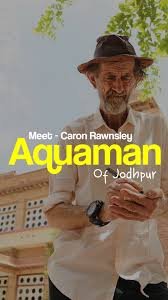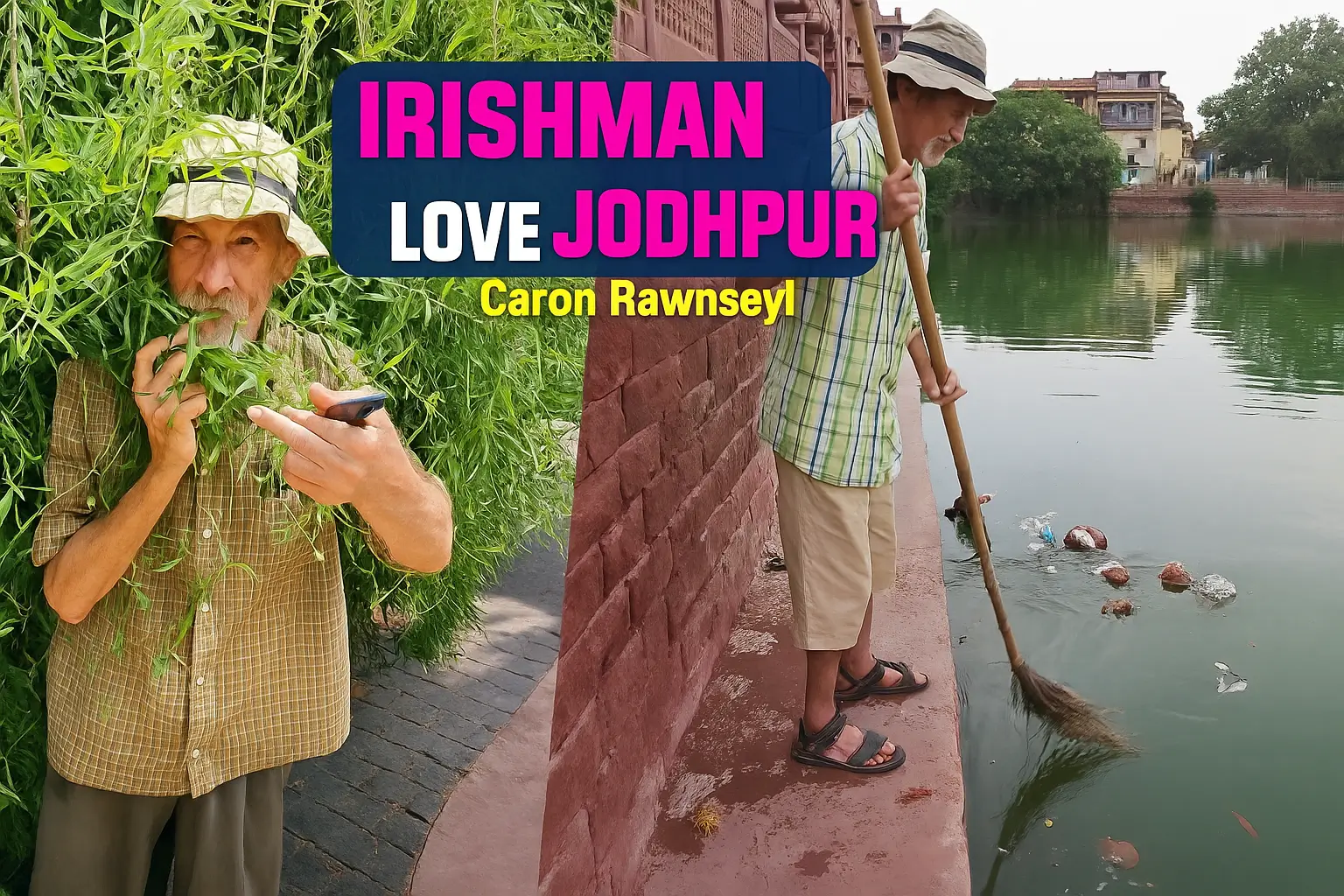
Caron Rawnsley, affectionately known as “The Aquaman of Jodhpur,” is an Irishman who has called the blue city home for many years. He earned his moniker through his tireless, voluntary devotion to cleaning and reviving the city’s ancient water bodies. His journey and deep commitment have become a beacon of inspiration across Jodhpur and beyond.
-
Historically, Jodhpur, a city on the edge of the Thar Desert, relied on ingenious water harvesting systems: stepwells (locally known as bawaris or jhalaras), lakes, and tanks.
-
These structures are engineering marvels that kept the city watered for centuries, employing complex methods to capture and store rainwater in one of the harshest climates.
-
With the advent of modern water supply systems like the Indira Gandhi Canal, these historic marvels fell into neglect, often being used as rubbish dumps or sewage vents and drifting into a state of disrepair.
Caron Rawnsley, a French-born Irishman, was in his early 70s by 2019. A true global citizen, he spent decades exploring different countries and cultures, influenced by a family legacy rooted in travel and engineering.
-
: Caron’s grandfather was a chief railway engineer on the famous Bombay-Baroda line and held a deep admiration for Indian culture and ingenuity.
-
: From 1988, Caron spent two transformative decades in Pakistan:
-
He volunteered as a teacher, focusing especially on children with hearing impairments.
-
Rawnsley built nurseries in state schools in lower Sindh, planting early seeds of conservation and creative education, all on his own—unsupported by government or nonprofit funding.
-
Despite his efforts, political challenges arose, and he was eventually treated as “persona non grata” by the British Embassy.
-
-
:
-
Drawn by both familial history and a passion for environmental issues, Rawnsley arrived in India seeking change.
-
He joined Barefoot College, a renowned NGO, for half a year to help renovate water harvesting systems.
-
After brief stints elsewhere—including an ultimately unsuccessful tree garden project near Jaisalmer—he found his calling in Jodhpur.
-
-
Discovering Jodhpur’s Forgotten Heritage:
-
Arriving in the latter half of 2014, Caron was dismayed to find Jodhpur’s beautiful stepwells choked with trash and often misused as public toilets.
-
This sight sparked the next—and perhaps most impactful—chapter of his life’s work.
-
-
Rawnsley first approached local authorities to urge action but received little response.
-
Undeterred, he began the laborious cleaning almost single-handedly—a solitary foreigner knee-deep in filth, often met with ridicule from passersby who dubbed him “Pagal Saab” (mad sir).
-
His determination, however, would soon win hearts and followers.
Through relentless hands-on work, Caron Rawnsley helped bring dozens of water bodies back from the brink. Notable among these are:
-
: Began cleaning almost alone from 2015, setting a precedent for community involvement.
-
-
: Later also restored and maintained with support from local hotels.
-
-
-
-
-
-
His solitary efforts at Mahila Bagh Ka Jhalra gradually drew in the local community, igniting a city-wide movement for restoration.
-
Rawnsley’s approach is grounded in personal labor: physical cleaning, debris removal, and gradual ecological restoration.
-
He actively welcomes volunteers and often receives logistical support from heritage institutions like the Mehrangarh Museum Trust.
-
His mantra, “protect, preserve, and educate,” guides each project from initial cleanup to long-term sustainability.
-
Restoration of Ancient Systems: Caron’s interventions brought ancient stepwells and reservoirs back to functional life, often restoring original water levels and flows.
-
: These rejuvenated water bodies now teem with life—from bats and migratory birds to fish, turtles, and even snakes—reviving local biodiversity.
-
: Sites like Toorji Ka Jhalra demonstrate marked improvements in water quality, becoming both ecological sanctuaries and public resources.
-
: Caron’s work inspires local residents and businesses to step up, shifting the narrative from apathy to pride.
-
: Young people from surrounding neighborhoods are encouraged to assist in ongoing maintenance and awareness.
-
: School excursions to the stepwells, often involving direct interaction with Caron, educate new generations about the importance of water heritage.
-
: Where once there was mockery and indifference, now there is admiration—a testament to the idea that meaningful change is possible for anyone, regardless of age, nationality, or background.
-
: Revived stepwells and water tanks become focal points for neighborhood renewal, inspiring restoration of adjacent heritage structures.
-
: Around places like Toorji Ka Jhalra, heritage hotels, shops, and cafes have sprung up, benefiting from the rejuvenated public spaces.
-
: Caron’s work not only preserves but actively celebrates India’s vast and ingenious historical water management systems, anchoring them in contemporary urban life.
Caron Rawnsley’s message to the world is simple and powerful:
“You can work for the betterment of any society, no matter your age, nationality or educational background.”
His unwavering commitment continues to ripple outward, inspiring residents, travelers, and conservationists alike. The story of an Irishman reviving the lifeblood of a Rajasthani city is a powerful reminder of the difference one person can make—and of the priceless value of preserving our shared heritage for future generations.





